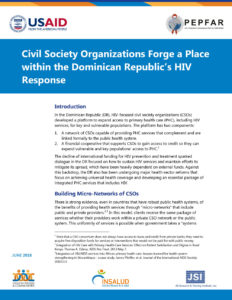What Does It Take for Civil Society Organizations to Come Together? Changing Approaches to Technical Assistance to Harness CSOs’ Potential to Mobilize Domestic Resources
September 25th, 2018 | viewpoint
As the global health community works toward achieving the ambitious Sustainable Development Goals (SDGs) by 2030, we are increasingly concerned about the limited resources and lack of sustainability in many development approaches. Given the breadth of the goals, leveraging all available sources of funding is imperative. Mobilizing resources within a country is a key way to meet health and development needs sustainably.
Using resources strategically—and increasing the pool of available funding domestically—requires a favorable policy environment coupled with systems and staff that can ensure effective use of funds.
Indigenous organizations are critical to mobilizing domestic resources through collaborative advocacy and are in a position to advocate for their governments to promote policies that will benefit their constituents. Furthermore, with extensive experience working with hard-to-reach population groups, civil society organizations (CSOs) often provide services that complement the formal health system and help scale up primary health care services.
Effective advocacy requires collaboration, but due to the current mechanisms to access funds, individual CSOs are often more focused on competing for international funds. This has been fueled by the traditional approach to technical assistance (TA) taken by international organizations, which focuses on enhancing an organization’s management capacity to be more competitive in accessing international funds and ensuring that financial and administrative systems adhere to donor requirements. International TA needs to focus more on strengthening CSOs’ capacity to build consensus and align priorities.
Technical assistance needs to build individual organizational capacity as well as enable collaboration and networking among CSOs so they can advocate more effectively. After all, more people—or groups—can have a louder voice and be more effective than one person or organization.
Since 2015, JSI Research & Training Institute, Inc., has provided TA to build CSO capacity through the consortium of Dominican CSOs led by INSALUD.[1] The goal is to help “nudge” the CSOs along their path to achieve stronger engagement, alignment, and coordination to mobilize resources in-country.
In recent years, the DR has undertaken health sector reforms to ensure universal coverage of essential primary health services. In this landscape of ambitious health goals and limited funding, CSOs in DR have been exploring new ways to work in partnership. As part of ongoing health reform, a legal framework has been developed to formalize public-private partnerships—including social contracting to increase access to the essential primary health services through SENASA, the national health insurance scheme. This legal framework allows the National Health Service to contract CSOs (individually or as a network) to provide services in areas that it doesn’t cover and that the public system doesn’t offer.
JSI supported 20 organizations in the consortium through a series of in-person workshops, long-distance TA, and mentoring. The TA, built on JSI’s 40 years of experience strengthening the capacity of CSOs in the U.S. and around the world, had two objectives: 1) to move each CSO toward greater sustainability; and 2) to help the consortium mobilize domestic resources and increase access to essential primary health services in the country.
The CSOs used the workshops to analyze the broader national context in which they function and to design strategies to maximize domestic resources. The workshops also helped the CSOs hone skills like negotiation, consensus building, networking, and partnering—all of which are instrumental to strengthening a consortium.
 As a result of this work, SENASA announced its intention to contract services provided by CSOs and private providers. A pilot of the approach demonstrated that it is possible for coordinated CSO coalitions to mobilize local resources, be part of the services mix, and support the expansion of primary health services.
As a result of this work, SENASA announced its intention to contract services provided by CSOs and private providers. A pilot of the approach demonstrated that it is possible for coordinated CSO coalitions to mobilize local resources, be part of the services mix, and support the expansion of primary health services.
The INSALUD coalition of CSOs is now contributing to increased access to primary health care. Four primary health care service networks have been created, and the coalition is now working with SENASA to formalize contracts. Learn more from this technical brief: Civil Society Organizations Forge a Place within the Dominican Republic’s HIV Response
JSI’s capacity-building support has resulted in more competent Dominican CSOs that are now collaborating and networking. They are complementing the services of the public sector and have achieved the goal of being contracted by the government to provide services. This social contracting from the government will result in improved access to and coverage of health services in the DR, promote efficient domestic resource allocation, and provide further evidence of how CSOs can leverage domestic resource allocations and support achievement of the SDGs.
[1] The Instituto Nacional de la Salud (INSALUD) is a private nonprofit public health organization in the Dominican Republic.
Written by Merce Gasco and Anne Austin
We strive to build lasting relationships to produce better health outcomes for all.